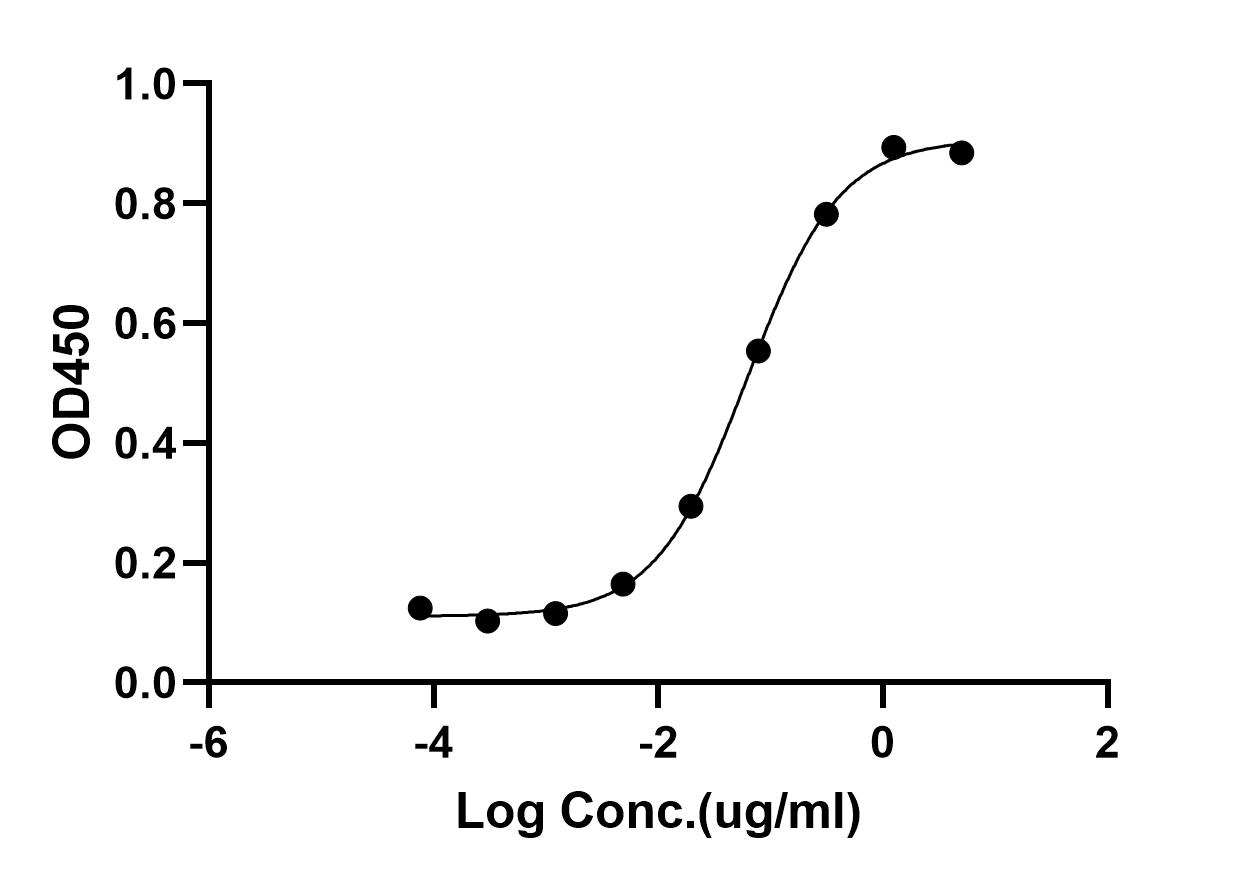CD33 (PN0407) Nb-FC recombinant antibody
- Catalog No.:YA0308
- Applications:ELISA
- Reactivity:Human
- Target:
- CD33
- Gene Name:
- CD33 SIGLEC3
- Protein Name:
- Myeloid cell surface antigen CD33 (Sialic acid-binding Ig-like lectin 3) (Siglec-3) (gp67) (CD antigen CD33)
- Human Gene Id:
- 945
- Human Swiss Prot No:
- P20138
- Immunogen:
- Purified recombinant Human CD33
- Specificity:
- This recombinant monoclonal antibody can detects endogenous levels of CD33 protein.
- Formulation:
- Phosphate-buffered solution
- Source:
- Camel, chimeric fusion of Nanobody (VHH) and mouse IgG1 Fc domain , recombinantly produced from 293F cell
- Dilution:
- ELISA 1:5000-100000
- Purification:
- Recombinant Expression and Affinity purified
- Concentration:
- Please check the information on the tube
- Storage Stability:
- -15°C to -25°C/1 year(Avoid freeze / thaw cycles)
- Other Name:
- CD33;SIGLEC3;Myeloid cell surface antigen CD33;Sialic acid-binding Ig-like lectin 3;Siglec-3;gp67;CD antigen CD33;CD33 nanobody;
- Background:
- domain:Contains 2 copies of a cytoplasmic motif that is referred to as the immunoreceptor tyrosine-based inhibitor motif (ITIM).This motif is involved in modulation of cellular responses. The phosphorylated ITIM motif can bind the SH2 domain of several SH2-containing phosphatases.,function:Putative adhesion molecule of myelomonocytic-derived cells that mediates sialic-acid dependent binding to cells. Preferentially binds to alpha-2,6-linked sialic acid. The sialic acid recognition site may be masked by cis interactions with sialic acids on the same cell surface. In the immune response, may act as an inhibitory receptor upon ligand induced tyrosine phosphorylation by recruiting cytoplasmic phosphatase(s) via their SH2 domain(s) that block signal transduction through dephosphorylation of signaling molecules. Induces apoptosis in acute myeloid leukemia (in vitro).,online information:Siglec-3,PTM:Phosphorylation of Tyr-340 is involved in binding to PTPN6 and PTPN11. Phosphorylation of Tyr-358 is involved in binding to PTPN6.,similarity:Belongs to the immunoglobulin superfamily. SIGLEC (sialic acid binding Ig-like lectin) family.,similarity:Contains 1 Ig-like C2-type (immunoglobulin-like) domain.,similarity:Contains 1 Ig-like V-type (immunoglobulin-like) domain.,subunit:Interacts with PTPN6/SHP-1 and PTPN11/SHP-2 upon phosphorylation.,tissue specificity:Monocytic/myeloid lineage cells.,
- Function:
- domain:Contains 2 copies of a cytoplasmic motif that is referred to as the immunoreceptor tyrosine-based inhibitor motif (ITIM). This motif is involved in modulation of cellular responses. The phosphorylated ITIM motif can bind the SH2 domain of several SH2-containing phosphatases.,Putative adhesion molecule of myelomonocytic-derived cells that mediates sialic-acid dependent binding to cells. Preferentially binds to alpha-2,6-linked sialic acid. The sialic acid recognition site may be masked by cis interactions with sialic acids on the same cell surface. In the immune response, may act as an inhibitory receptor upon ligand induced tyrosine phosphorylation by recruiting cytoplasmic phosphatase(s) via their SH2 domain(s) that block signal transduction through dephosphorylation of signaling molecules. Induces apoptosis in acute myeloid leukemia (in vitro).,online information:Siglec-3,PTM:Ph
- Subcellular Location:
- [Isoform CD33M]: Cell membrane ; Single-pass type I membrane protein.; [Isoform CD33m]: Peroxisome . CD33m isoform does not localize to cell surfaces but instead accumulates in peroxisomes. .
- Expression:
- Monocytic/myeloid lineage cells. In the brain, CD33 is mainly expressed on microglial cells.
- June 19-2018
- WESTERN IMMUNOBLOTTING PROTOCOL
- June 19-2018
- IMMUNOHISTOCHEMISTRY-PARAFFIN PROTOCOL
- June 19-2018
- IMMUNOFLUORESCENCE PROTOCOL
- September 08-2020
- FLOW-CYTOMEYRT-PROTOCOL
- May 20-2022
- Cell-Based ELISA│解您多样本WB检测之困扰
- July 13-2018
- CELL-BASED-ELISA-PROTOCOL-FOR-ACETYL-PROTEIN
- July 13-2018
- CELL-BASED-ELISA-PROTOCOL-FOR-PHOSPHO-PROTEIN
- July 13-2018
- Antibody-FAQs
- Products Images

